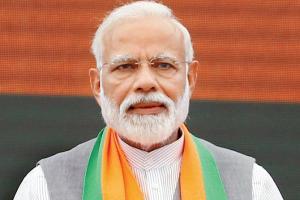The Lok Sabha election this time around is largely a face-off between pro- and anti-Modi voters

Prime Minister Narendra Modi
 It was Narendra Modi in 2014, and it is him again in 2019. That's Lok Sabha elections for you. Five years ago, the people turned it into a tsunami that swept the ruling UPA away like never before. After that landslide victory, voters today are split vertically — pro-Modi and anti-Modi. Of course, the majority shall win.
It was Narendra Modi in 2014, and it is him again in 2019. That's Lok Sabha elections for you. Five years ago, the people turned it into a tsunami that swept the ruling UPA away like never before. After that landslide victory, voters today are split vertically — pro-Modi and anti-Modi. Of course, the majority shall win.
What is striking is that the PM's party comes later in the order of discussion in the public discourse. Modi is dissected as the country's neta who has taken policy decisions that find both favour and opposition among contemporary leaders and the janta. The articulate speak up, debate and counter each other in the streets and drawing rooms. Views expressed are extreme, the language exchanged is unheard of and the passion unseen in recent times.
ADVERTISEMENT
The first phase of the campaign and a moderate turnout in Vidarbha's seven seats showed up the wide polarisation of pro- and anti-Modi people in both urban and rural areas. The BJP banks heavily on urban votes, whereas the Congress-NCP think the rural people would rescue them.
I met families in Vidarbha that are split over Modi and his opponents. And, fathers and sons do not share the same views. Friends, who swear by the bond of love between them since kindergarten, are divided over political choices. Close-knit messaging groups see tempers running high.
Following Modi's rallies, Congress president Rahul Gandhi seem to have found traction that was unimaginable for his party clan. It would be interesting to see how the Congress and UPA partners keep the momentum up in the remaining 41 seats that will go to polls in three more phases till April 29.
The genesis
The division has its genesis in the ideology of the respective parties, the religious and caste equations in that particular segment, alleged scams and the accused, the comparison between the current regime and previous regimes (primarily based on the speeches that leaders made and experience of governance), the leadership abilities in the government and opposition, and trivial social media posts that are made viral in the campaign.
What struck me most was that people didn't have any clear-cut anti-BJP government sentiment. Good for the ruling party, but then people talked more about liking or disliking individuals in the BJP, and burning local issues that are common to several constituencies and remained unresolved for years. It did not matter if the issues were related to New Delhi or the state government. But, I saw a Congress candidate in Yavatmal telling the voters very clearly that the agrarian crisis wasn't entirely the state government's job, but it was the Union government and the MPs that the people elected who were more responsible in this particular area. He said the MP should be more pro-active and understand the deciding factors such as it is the Centre that takes all the decisions related to pricing and marketing of the produce of suicide-affected regions.
The obvious
The undercurrent was obvious even before the elections were declared. It was certain that the Muslims wouldn't vote for the BJP. The Dalits had made up their mind to think of anyone other than the ruling party. The reasons lie in the conduct of the BJP and its affiliates in the past five years. Maharashtra may be the state that hasn't witnessed any communal riot or major incidents of Dalit atrocities, but reservation for the upper caste has upset the Dalits. The question again is where would Muslims and Dalits shift their loyalties? The UPA or non-Congress outfits such as Vanchit Bahujan Aghadi and Bahujan Samaj Party? The Muslims seemed definitely decided in favour of the Congress.
It would be foolish to say the BJP hadn't factored in the Dalit-Muslim polarisation before going to the polls. The Congress has made the contests interesting by fielding candidates on the basis of dominant caste groups. The BJP expects the Congress strategy to polarise other castes in its favour.
This election is not just about a power clash between the principal parties, but it's more about a face-off between the sections of voters.
Dharmendra Jore is political editor, mid-day. He tweets @dharmendrajore Send your feedback to mailbag@mid-day.com
Catch up on all the latest Crime, National, International and Hatke news here. Also download the new mid-day Android and iOS apps to get latest updates
 Subscribe today by clicking the link and stay updated with the latest news!" Click here!
Subscribe today by clicking the link and stay updated with the latest news!" Click here!







